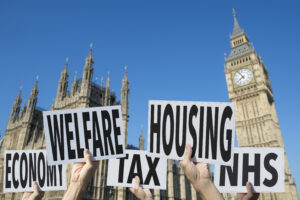Has the country ever been in as bad a state as it is today? It’s a question that gets discussed in maybe half the business meetings I attend at the moment, and I’m sure I’m not alone in hearing that. There is little point in dwelling on the symptoms of today’s malaise, but from a couple of podcasts I’ve been listening to recently, and a bit of research, I can confirm that the answer to the question is “yes, the country has been in a far worse state than it is today”. More importantly, it recovered from that state.
Exactly 50 years ago, Britain was in a terrible way. The Conservative government of Edward Heath had called an election on the question of who governed Britain. Was it the unions, whose strikes had led to power cuts and a three-day-week, or was it the ruling party? Sadly for Heath, the electorate decided the answer definitely wasn’t him and Harold Wilson was re-elected, having lost to Heath in 1970. Inflation was north of 20% and the country was running out of money, becoming a laughing stock internationally. Rather than getting a grip of the economy, the Labour party was also riven with disputes over matters such as whether all industries should be nationalised and who would get to eat lunch with Mr Wilson!
Unfortunately, another five years of decline were to follow, culminating in Britain seeking a bailout from the IMF, the winter of discontent in 1978-79 and the arrival of Margaret Thatcher in 1979. It was only when the Thatcher government made the tough decisions that were at least 15 years overdue that economic stability and then growth returned, creating the conditions for Britain’s long economic recovery up to 2008. Britain became an outward facing, investor-friendly country, enjoying rapid productivity and income growth until the shock of the financial crash, from which we are still suffering now.
In the March 1974 Budget, Dennis Healey raised the corporation tax rate from 40% to 52% and increased the highest rate of income tax to a whopping 83%, with a 15% surcharge for “unearned” income taking it to 98%. It is not difficult to see why there was so little investment back then when there was so little reward for taking risks, and yet we seem to have failed to learn the lessons. An entrepreneur who makes £100 profit in a company today receives as little as £45.49 in their personal bank account after tax. The company that takes on a new worker has to pay an amount equal to 13.8% of the employee’s wages to the government simply for the pleasure of providing someone with a living, regardless of whether that company makes a profit or not. The same company also has to pay business rates to occupy a property, again profitability notwithstanding.
These taxes are an unwelcome and inefficient cost of business to large companies but they are a real impediment to growing companies. For evidence of the disincentive to growth that the tax system provides, look no further than the number of businesses whose profits are just below the VAT threshold of £85,000 (£90,000 from April).
Sadly, working to increase turnover comes at a cost and for many, hitting the VAT limit is a massive obstacle to growing their business, while for others it is a disincentive to keep accurate records. Whilst there are no figures to prove it, it doesn’t take a huge leap of imagination to see that this leads many to operating on the edges of the black economy, when they could instead be contributing to the Treasury.
Arguably the best way of dealing with this would be to reduce the VAT registration threshold to nil (or as close to nil as possible). Everyone trading charges VAT, it becomes more difficult to evade VAT, there would be a significant boost to the Treasury, and VAT would not be an active disincentive to growth – a quadruple win!
Unfortunately, the government seems disinclined to take the steps required to overhaul the VAT or business rates systems but they could generate easy wins for the economy and, therefore, the Treasury.
The great lesson of the 1980s and Nigel Lawson’s tax cutting budget of 1988 was that reducing tax rates, once affordable, actually increased the overall tax take. I’m certainly not arguing for a return to Trussonomics but I do worry that the current focus on balancing the books on the back of business rather than focusing on the measures which can be taken to boost growth and encourage entrepreneurship is unlikely to see the UK quickly returning to sustained and strong growth. The Labour Party has promised to achieve the highest sustained rate of growth in the G7. When, as seems inevitable, Rachel Reeves is installed in Number 11, it is to be hoped that she runs the economy in the mould of Nigel Lawson rather than Dennis Healey or, dare I say it, Jeremy Hunt.
Sadly, I do not believe that this month’s Budget was the catalyst for our national revival, although neither did it generate even a fraction of the trouble caused to the country by its counterpart in 1974. In the meantime, I, along with all of you, can only hope that the interests of business and economic growth will once again be at the forefront of tax policy.




